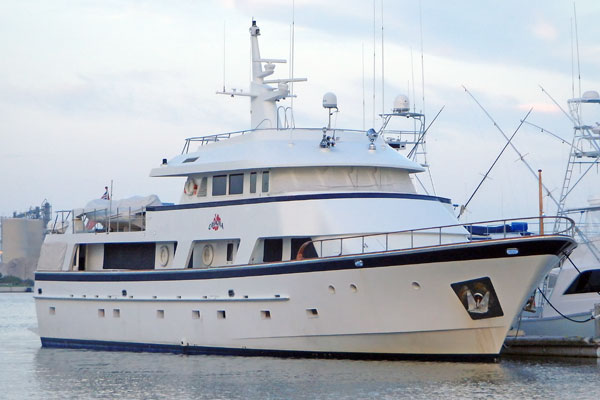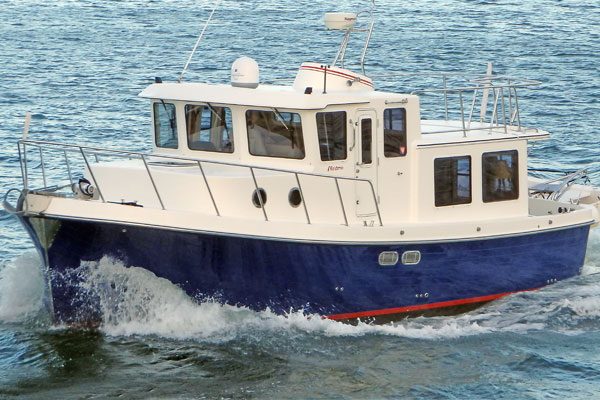Finding the right trawler is a time consuming vocation and though most buyers are savvy enough to determine their preferences and locate a desirable trawler for sale, the actual transaction process, from making an offer to closing the deal, can take a confusing path with twists and turns that end up in frustration, unexpected expenses and wasted time. It’s a much simpler process if you find a trusted yacht broker who will protect your interests during the hunt, throughout the purchase negotiations, and even after the sale. Interestingly enough, picking your yacht broker is typically not your choice to make…at least that is how the industry has set it up.
Put yourself into the shoes of the yacht brokerage owner who wants to provide for their sales staff. Every email, phone call, walk in, etc. is a “LEAD” to be distributed to the salesperson who is “UP”. Most boat buyers have no idea that by making a call they have created what can amount to a lifelong relationship with the salesperson who happened to pick up the phone. Some companies even turn a seemingly innocent purchase of a hat or shirt into a “LEAD” and assign the buyer to a salesperson.

If you have been to a boat show or two, you may realize that those “BOARDING PASSES” where you filled out your name, address, phone number, and email so you could take a tour have been integrated into the company contact management system and you now not only have a permanent home in the data base, but you have a salesperson assigned to your “ACCOUNT”. Don’t worry, this is how it has been done for ages. In all fairness, every sales organization has to manage client distribution somehow, but what can you do if the salesperson you are identified with doesn’t quite “connect” with you?
For most buyers, purchasing a trawler is not an impulse purchase. It is a long, drawn out, well-analyzed process that can be done in a matter of weeks, but on average takes five years from original contact to purchase. Five years may seem like nothing to you- you may need that much time to get your personal affairs in order to be able to take off on this grand adventure. But to most salespeople five years is FOREVER. It is much preferred, from the sales side, to have buyer call in who has already done all of their research online, knows exactly what they are looking for, and is ready to write up a contract and purchase a trawler right now, TODAY. However, this is extremely rare and unrealistic and, quite frankly, it takes a lot of fun out of the business.
The process of getting to know clients, hearing what their boating plans are, looking at potential boats together, growing through the learning curve, and explaining the multitude of decisions they need to make is what truly cultivates a “RELATIONSHIP”.
The broker you select should be experienced in the type of boat you are looking for and absolutely should be someone you can confide in and trust. The best yacht brokers have a reputation for taking care of their clients and putting together deals that bring satisfaction to both the buyer and the seller.
Your yacht broker needs to know you very well and what your cruising plans are in order to find the right boat for your purposes. This is a huge responsibility that requires a strong work ethic and professionalism throughout the process. Your broker should practice excellent communications skills, promptly respond to your phone calls and emails, have attention to detail, and be a good listener. He/she needs to maximize your valuable time while minimizing distractions and interruptions and help you enjoy the process.
It’s best if you can meet with your yacht broker in person and continue the relationship with phone calls, texts, and emails. This is a major purchase, and your yacht broker should help you understand that the spending does not just end with the purchase price. There are many other expenses, such as maintenance considerations, repairs, and upgrades.
When your broker finds the right type of trawler, you will have more time to work on comparison spread sheets. These should evaluate what is on the market and include the differences and advantages of each available trawler you have developed an interest in. Your broker should also provide an analysis of what similar trawlers have sold for and what closing prices were achieved with an explanation of the comparative differences in asking prices, time on the market, systems and equipment selections, condition, and location of the trawlers.
Well-connected brokers offer an additional benefit. Connected brokers have a network of resources that they can make available. They build on this by staying actively involved in the industry by remaining tuned into the market.
You should look for a yacht broker who can assist you in all aspects of the purchase process. To start, it begins by researching choices and arranging viewings. When you identify a trawler that piques your interest they can help you make an offer by providing you with legally vetted purchase agreements. Your broker should hold your deposit in a safe, bonded brokerage trust account (escrow). They should be able to guide you to legal advice to understand titling (family trust, LLC, etc.) and taxes (sales tax, property tax, use tax, etc.).
 A good yacht broker will have a list of questions to help you hire a surveyor (hull and diesel mechanic) and help you assemble your trawler buying team by referring you to insurance providers and yacht financing lenders. Being able to help you find a haul out yard for the inspection and advise on where you can keep your boat after the deal closes are also important attributes they need to possess. You should be able to rely on your broker to recommend a documentation service that will check on liens, create a bill of sale, transfer USCG documentation, and confirm tender registration.
A good yacht broker will have a list of questions to help you hire a surveyor (hull and diesel mechanic) and help you assemble your trawler buying team by referring you to insurance providers and yacht financing lenders. Being able to help you find a haul out yard for the inspection and advise on where you can keep your boat after the deal closes are also important attributes they need to possess. You should be able to rely on your broker to recommend a documentation service that will check on liens, create a bill of sale, transfer USCG documentation, and confirm tender registration.
Once the offer on your new trawler is accepted, there are a lot of “moving parts” that quickly become actionable. An experienced broker may create a detailed timeline that identifies who is responsible for what and when tasks are due along with a summary of the contacts.
After the sale, your broker should set aside some time to help you become acclimated. He/she should have the product knowledge and expertise to train with you on systems operations and practice boat handling with you to make sure you are comfortable with your new boat and understand how to operate it confidently. Checklists for startup, engine room inspections, watch standing, and port arrival are helpful tools that your broker may be able to provide for you. Another important skill is to help you determine which tools you will need, spare parts to inventory, and repairs or upgrades to prioritize.
Your broker should ease your introduction into the trawler lifestyle. He/she should introduce you to other trawler owners and owners’ clubs. Once you are on your new trawler, even though you need to break free and cruise on your own, you should expect a few follow up phone calls. Your broker should check in to see how you are adapting and help answer any questions that come up as you embrace the trawler lifestyle with your family and friends.
You should be looking for a yacht broker who can assist you in all aspects of the purchase process. To start this begins by researching choices and arranging viewings. When you identify a trawler of interest they can help you make an offer by providing you with legally vetted purchase agreements. Your broker should hold your deposit in a safe, bonded brokerage trust account (escrow). They should be able to guide you to legal advice to understand titling (family trust, LLC, etc.) and taxes (sales tax, property tax, use tax, etc.).
